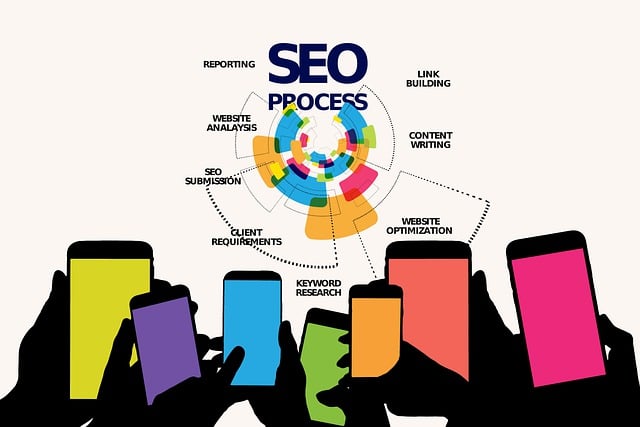By 2025, digital marketers must adapt to a content ranking landscape transformed by AI advancements and shifting consumer behavior. To improve SEO rankings, creators need to understand user preferences, craft keyword-rich content, stay informed on trends, and optimize for mobile friendliness, speed, and structured data. Voice search growth demands natural language and contextually relevant content. User Experience (UX) metrics, including Core Web Vitals, are crucial for gauging satisfaction and driving longer visits. High-quality backlinks from authoritative sites signal credibility to search engines. Micro-content optimization caters to rapid information demands, enhancing indexing and engagement. Social media integration leverages platforms like Instagram, Twitter, and TikTok for content discoverability and audience interaction. Marketers must constantly monitor search patterns and adapt strategies to stay competitive in the evolving digital landscape.
In 2025, understanding content ranking dynamics is more crucial than ever for improving SEO rankings. This article delves into the key factors reshaping search algorithms, offering insights on optimizing content for voice search and AI assistants, enhancing user experience, leveraging high-quality backlinks, exploring micro-content’s impact, integrating social media, and predicting future trends. By embracing these strategies, content creators can navigate the evolving landscape and significantly boost their online visibility.
Understanding Content Ranking Dynamics in 2025

In 2025, understanding content ranking dynamics is more crucial than ever for digital marketers and content creators aiming to improve SEO rankings. The landscape has evolved significantly, driven by advancements in AI technology and a shift in consumer behavior. Search engines are now equipped with sophisticated algorithms that analyze vast amounts of data in real-time, ensuring only the most relevant, high-quality, and engaging content reaches the top search results.
This new era demands a deep understanding of user preferences, as search engines actively cater to individual needs and personalize search results. High-ranking content will not only be keyword-rich but also tailored to specific user queries, offering unique insights, solutions, or entertainment value. Staying ahead involves staying informed about the latest trends in consumer behavior, content formats, and search engine algorithms to continuously refine strategies for better visibility and improved SEO rankings.
Key Factors Boosting SEO Rankings in the New Year

As we step into 2025, the digital landscape is ever-evolving, and so are the algorithms that govern search engine optimization (SEO). To improve SEO rankings, content creators and marketers must stay agile and adapt to these changes. High-quality, relevant, and unique content remains a cornerstone of successful SEO strategies. Investing in comprehensive keyword research and integrating these keywords naturally into your content can significantly boost visibility online.
Technical aspects also play a pivotal role in enhancing search engine performance. Ensuring your website is mobile-friendly, secure (HTTPS), and has fast loading speeds are essential factors that contribute to better rankings. Additionally, implementing structured data markup and optimizing metadata can provide search engines with more context, leading to richer snippets and increased click-through rates.
Optimizing Content for Voice Search and AI Assistants

As voice search continues to grow, optimizing content for AI assistants is crucial to improve SEO rankings in 2025. With advancements in natural language processing (NLP), virtual assistants like Siri, Alexa, and Google Assistant are becoming more sophisticated in understanding user queries. To capitalize on this trend, content creators should focus on incorporating long-tail keywords, conversational language, and contextually relevant information that mimics how humans speak. This shift towards voice search optimization means crafting content that is easy to scan, answers questions directly, and prioritizes user experience over traditional keyword stuffing.
Additionally, leveraging AI tools for content analysis and personalization can further enhance SEO efforts. Artificial intelligence can provide valuable insights into user behavior, helping content developers tailor their material to meet specific needs and preferences. By embracing these changes, marketers and content producers can stay ahead of the curve, ensuring their online presence remains competitive in a voice-driven digital landscape.
The Role of User Experience in Content Ranking Algorithms

In the ever-evolving digital landscape, understanding user experience (UX) is pivotal for content creators and marketers aiming to improve their search engine optimization (SEO) rankings in 2025. Content ranking algorithms have become increasingly sophisticated, factoring in UX metrics beyond traditional keyword usage and backlink profiles. Google’s Core Web Vitals, for instance, measure factors like loading speed, interactivity, and visual stability, all of which significantly impact user satisfaction and engagement. By optimizing content delivery and interaction, creators can enhance these vital signs, making their content more appealing to both search engines and users.
User experience plays a dual role in content ranking. Firstly, it encourages longer user dwell times, lower bounce rates, and increased page views—all strong signals to algorithms that the content is valuable. Secondly, UX considerations like mobile responsiveness, easy navigation, and clear information architecture ensure that visitors have a seamless browsing experience, encouraging them to explore more of the site. As search engines prioritize delivering relevant, high-quality content to users, prioritizing excellent UX becomes not just a best practice but a necessity for staying competitive in 2025 and beyond.
Leveraging High-Quality Backlinks for Better Visibility

In the ever-evolving digital landscape, understanding how to leverage high-quality backlinks remains paramount for improving search engine optimization (SEO) rankings in 2025. Backlinks from authoritative and relevant websites act as a vote of confidence in your content’s credibility, signaling to search engines that it is valuable and trustworthy. This, in turn, boosts your website’s visibility and drives organic traffic.
To maximize the impact of backlinks, focus on acquiring them from reputable sources within your industry. Engaging in strategic outreach, contributing high-quality guest posts, and creating shareable content can help secure these crucial links. By aligning yourself with influential brands or thought leaders, you not only enhance your SEO but also position your brand as a respected authority in your niche.
Exploring Micro-Content and Its Impact on Search Results

In the ever-evolving digital landscape, understanding micro-content and its influence on search results is paramount for anyone aiming to improve SEO rankings in 2025. Micro-content refers to short, focused pieces of content optimized around specific keywords or phrases, designed to cater to users’ quick information needs. This strategy has gained significant traction due to the rise of voice searches, mobile browsing, and fast-paced digital interactions. By breaking down complex topics into bite-sized chunks, creators can enhance user experience and encourage engagement, both crucial factors for search engines.
Search engines like Google have started to recognize the value of micro-content in delivering relevant, concise answers to users’ queries. Optimizing content at this granular level allows for better indexing and can lead to higher rankings on search results pages. Additionally, micro-content strategies encourage a more interactive user journey, resulting in reduced bounce rates and increased time spent on sites – signals that search algorithms consider when evaluating website quality.
Social Media Integration: Enhancing Content Discoverability

In the digital landscape of 2025, Social Media Integration plays a pivotal role in enhancing content discoverability, thereby improving SEO rankings for businesses and creators alike. Platforms like Instagram, Twitter, and TikTok have evolved from mere social hubs to powerful content repositories, where trends set and audiences engage. By seamlessly integrating their content with these channels, brands can tap into vast user bases and diversify their online presence. This strategy not only amplifies reach but also encourages organic sharing, which is a significant boost for search engine visibility.
Moreover, the interactive nature of social media—with features like user comments, shares, and likes—serves as a signal to search engines that the content is engaging and valuable. This can significantly influence algorithms that rank web pages, pushing integrated content higher in search results. As content marketing strategies continue to evolve, leveraging social media platforms becomes an indispensable component for any digital marketing plan aiming to improve SEO rankings in 2025.
Predicting Future Trends: Continuous SEO Strategy Evolution

As we step into 2025, predicting future trends in content ranking and search engine optimization (SEO) is more crucial than ever for digital marketers. The algorithms that drive rankings are constantly evolving, learning from user behavior and technological advancements. To keep up, content creators must embrace a dynamic SEO strategy that adapts to these changes. Continuous monitoring and analysis of search patterns will be key to identifying emerging keywords and topics that resonate with audiences.
By staying ahead of the curve, marketers can optimize their content for both current and anticipated search trends, ensuring their online visibility and improving SEO rankings. This involves a deep understanding of consumer needs and preferences, as well as the ability to create compelling, relevant, and unique content that stands out in an increasingly competitive digital landscape.
